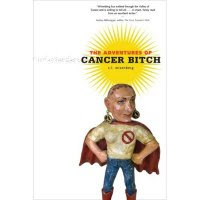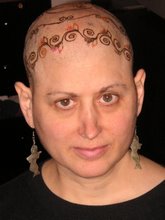
O O O this should not bother me, but after all I'm the Bitch, and so many things can bother me that wouldn't bother a non-bitchy person. There's a woman who was diagnosed with breast cancer at Sloan-Kettering, just one of 200,000 women who will hear that the test was positive this year, and the noteworthy thing about her is that she's the Wife of a Doctor. A Doctor at Sloan-Kettering, and ain't that ironic or crazy or what-have-you, and since this is the age of irony, her husband gets to write about the experience in the New York Times. Am I jealous? Yes. Is that what's fueling my ire? Yes. No. Am I annoyed that he writes in an ungainly fashion and strains when he makes comparisons and isn't very interesting? Yes. Am I jealous? O, we covered that. Sort of. It's in the New York Times blog, not print, and since cyberspace is everywhere and nowhere, in a way you could say that it is not in the New York Times, or you could say it is there and everyplace else in the known world. But even at the blog, aren't there editors? Must not be, otherwise we wouldn't have such sentences as: The late nights along the Seine were as dark and dreary as the sunshine was bright that Wednesday morning on the Upper East Side of Manhattan.
The author is a doctor at Sloan-Kettering. What kind of cancer doctor? No one says. He admits that the white coat has been his protection against involvement and emotion. But anyone who's ever visited a hospital could tell you that. He also has pull, not surprisingly. He tells us that they got an appointment with a friend who's a breast surgeon: When I told him Ruth had felt a lump, he had made room to see us right away.
Which is nice. And I'm sure they have insurance, which is good because I doubt that professional courtesy would pay for all her subsequent treatments. Which is good for them, especially since they seem pretty young and it appears from this first installment that the cancer has spread to her lymph nodes. (Though you've read here that removing cancerous lymph nodes may not be required, after all.)
Of course, a more erudite decision on the part of the Times would have been to tap (virtually) the shoulder of the Cancer Bitch and offer her the blog spot. She could write: When the Cancer Bitch has Blood Cancer, a comedy of manners that has not yet ended. But the tap was not received, no messages were left. And a more relevant and important and serious decision would have been to get an uninsured woman to write about her breast cancer. Or, second best, the husband of said woman. Or daughter. Finding such a person would be easy--it is said in these parts that a scoffing full professor (the kind who hires adjuncts) once said he could spit outside the window of his office downtown and spray any number of PhDs, the point being that those with doctorates in English should be grateful, o so grateful, hat in hand and bowing and scraping, if and when they were offered a couple thousand dollars for teaching a course as an adjunct. So too, unapocryphally, you could walk to to the county hospital here, named for a politician, John Stroger, who spent his last days, comatose, in a private hospital (Fancy Hospital, in fact), and find hosts and hosts of people without health insurance. Interestingly, ABC News told us: Stroger lost a brother who was turned away from a segregated hospital in the South, and the availability of quality healthcare became his pet issue. He struggled for decades -- sometimes alone -- to make sure the Cook County Hospital remained open. There was a libertarian Republican named Tony Peraica who ran against Todd Stroger, son of John, for Cook County Board president, and I didn't like Peraica's politics at all, but I had to appreciate one commercial in which he said he would improve Cook County Hospital so that it would be good enough for John Stroger to go to. Peraica lost and Stroger died and Ariel Sharon remains cocooned in his own coma, and I think no one in Israel has the chutzpah to pull the plug on him. The photo above right is of a sculpture of Sharon by artist Noam Berlavsky.
The transformation implied in the blog, I think, is that a doctor regains his vulnerability and dare we say humanity, not to mention humility, when he is the spouse of a patient, and not a Doctor draped in sanitary whites. This is a tricky concept, because we writers would tell him that the story is his--but if he makes the story too much his own, he will seem like a cad because it's his wife who was stricken. The best thing for him, in order to remain a sympathetic narrator, is to contract a serious disease himself. But such things take time.








